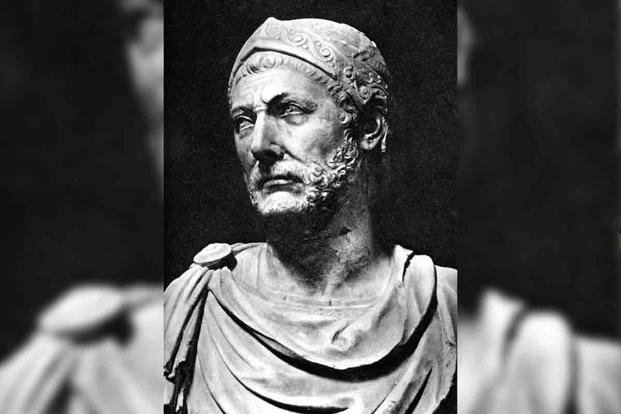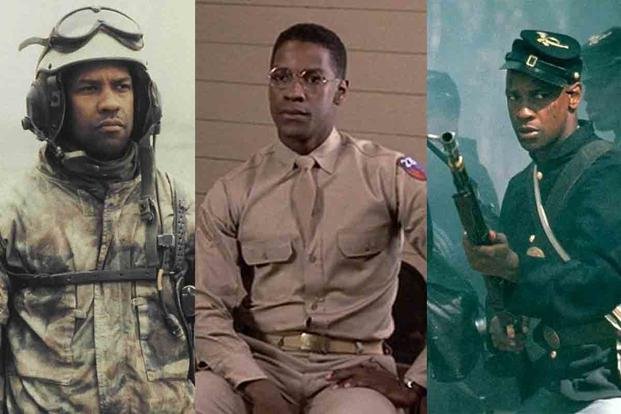There are countless movies about or set in the Roman Empire, but it sometimes feels like Hollywood forgot about Hannibal Barca, the Carthaginian general who terrorized Rome in its early years.
Not anymore.
Deadline reports that Denzel Washington is reteaming with director Antoine Fuqua ("Training Day," "The Equalizer 3") for an as-yet untitled take on Hannibal's story for Netflix. Screenwriter John Logan, who was on the team that brought us "Gladiator," rounds out an all-star squad that should give any war movie fan goosebumps.
And with good reason: Hannibal's story is so incredible, even the Romans admitted it. Imagine building a statue of your childhood bully in recognition of all the terrible ass-kickings he delivered before you finally punched him in the face. Sure, Rome's empire might have been one of the longest-lived and most powerful empires in 5,000 years of recorded history, but it was so beaten and humiliated by Hannibal that Rome eventually built a statue for him.

Centuries before the BC-AD changeover, Rome and the North African city of Carthage engaged in a series of wars that spanned almost 80 years. There were three of these Punic Wars (named for the ancient Greek word for Phoenician, from which people of Carthage we descended), each shorter than the one before it. They were so epic (literally and figuratively) that historians still pour over things like "Fabian Strategy," double envelopment and unified command -- even at the U.S. Army War College.
Back in 264 BC, Rome was a shadow of what it would one day become and Carthage was the regional powerhouse. The two first went to war over control of Sicily that year, which was mainly fought at sea. The Romans won control of the island and pressed on to invade North Africa. It was there the two engaged in the Battle of Cape Ecnomus, which featured almost 300,000 combatants, making it the largest naval battle in history by the number of troops involved. Carthage would sue for peace and pay reparations to end the war. But that's what led to Hannibal's rise.
In 221 BC, Carthaginian general Hasdrubal the Fair, viceroy of Iberia (what is today Spain), was assassinated, bringing his brother-in-law, Hannibal Barca, to prominence. The Second Punic War began after Hannibal, then 26 years old, laid siege to the Roman-allied city of Saguntum in Spain and sacked it.
Rome demanded Hannibal be sent to Rome for punishment. Instead of that, they went to war.
In 218, Hannibal famously crossed the Alps in 15 days with 20,000 troops, 6,000 cavalry and some elephants. Rome's army had already gone into winter quarters, allowing Hannibal to absolutely crush every Roman force in Northern Italy. What's worse for Rome was that Hannibal wasn't losing troops, but in fact was gaining them as more Roman allies defected.
The Second Punic War saw Hannibal deliver the worst defeat by any army against another in recorded history at the Battle of Cannae. Hannibal's troops killed 70,000-80,000 of Rome's 86,000 soldiers, making it the most lethal day of warfare until World War I. Carthage kicked Roman armies around for nearly a decade after Cannae. It wasn't until 210 BC, when Roman general Scipio began to turn the tide.

Scipio took the fight first to Carthaginian Iberia and then to Carthage itself. Carthage's allies began to defect as a large Roman army landed in North Africa. Hannibal was recalled to defend the city, met Scipio's army at Zama and was soundly beaten by an inferior Roman force. Hannibal escaped, but Carthage would never be the same. Scipio earned the title "Africanus" after forcing Carthage into a humiliating peace that subjected the city-state to Roman oversight.
Hannibal would eventually become a fugitive, attack Roman allies for different nations and eventually kill himself after being cornered by Roman troops. Despite his untimely end, he was so terrifying to Romans that, for centuries after his death, they would still shout "Hannibal ad portas" ("Hannibal is at the gates") to describe emergency situations.
Now that Washington, along with the creators who made "Training Day" and "Gladiator," is turning the story into a movie, the rest of the world will learn why. There's no release date set for it, but it is rumored to be in 2024.
-- Blake Stilwell can be reached at blake.stilwell@military.com. He can also be found on Facebook, X or on LinkedIn.
Keep Up With the Best in Military Entertainment
Whether you're looking for news and entertainment, thinking of joining the military or keeping up with military life and benefits, Military.com has you covered. Subscribe to the Military.com newsletter to have military news, updates and resources delivered straight to your inbox.

















